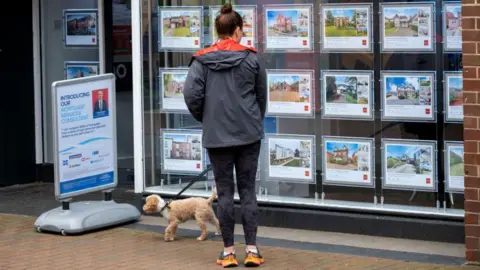Business reporter
 Getty Images
Getty ImagesChancellor Rachel Reeves has some big decisions to make ahead of the Budget in November.
Economists say she is on track to break her own rules on government borrowing unless she can find billions to make up the difference between the amount being spent on public services and generated through taxes.
To fill the gap, reports have suggested the government is considering shaking up stamp duty and other property taxes – having repeatedly ruled out raising income tax, employee national insurance or VAT.
These changes could raise billions but also come with a range of downsides.
Capital gains tax changes
Capital gains tax (CGT) is a charge on the increase in the value of an asset when you sell it.
It applies to the sale of things like paintings, second homes, and stocks and shares, but main homes are currently exempt from CGT.
So, if you bought the main home you live in for £200,000 and sold it for £210,000, you are entitled to all of that £10,000 – barring some exceptions such as for those whose main homes are over 5,000 sq m (just over an acre) or who have let part of it out.
The government is considering removing this relief for pricier homes, according to the Times, which would mean those sales would be subject to CGT, the current rates being 24% for higher-rate taxpayers and 18% for lower-rate taxpayers.
How much this would raise depends on what the value threshold is for homes to be hit by the tax – in the last financial year, the tax raised £13.3bn.
Critics argue that removing CGT relief for higher value home sales would slow down those transactions, meaning it might not raise as much as the government would like.
Simon French, chief economist at Panmure Liberium, told the BBC that axing the relief “would be potentially incredibly lucrative but also incredibly controversial”.
Abolishing stamp duty
Another change the government is reportedly considering is the abolition of stamp duty, which is a tax on the purchase of homes.
Unlike CGT, this tax does not apply to the change in value of the property but to the value of the property when bought.
Those buying homes for less than £125,000 do not pay stamp duty. First-time buyers do not pay stamp duty on properties worth up to £300,000.
Those buying homes worth more pay a percentage of the value of the home.
Colleen Babcock, Rightmove’s property expert, says the tax is “a huge barrier to movement, from first-time buyers to downsizers”.
However, getting rid of stamp duty would also mean lost revenue, with £11.6bn raised from the tax in the last financial year.
As such, reports suggest any abolition of stamp duty would come alongside other property tax changes.
Introducing a national property tax
One such replacement for stamp duty could be a national proportional property tax on home sales worth over £500,000, which the Guardian has reported.
According to a report by Dr Tim Leunig, which is said to be influencing the Treasury’s thinking, the tax would be payable by buyers of homes over that threshold but on an yearly basis after purchase rather than upfront.
The annual rate would be set by the government, but the report suggests it should be 0.54% of a property valued between £500,000 and £1m, and a higher rate for any home value beyond £1m.
This would mean people with homes valued under £500,000 would not pay anything.
The report said this tax would raise as much as stamp duty each year, but Savills’ head of residential research Lucian Cook said a gradual annual levy would not replace the lost revenue that stamp duty upfront payments provide immediately.
As such, he said the idea “probably falls at the first hurdle” because it would take time for it work.
Replacing council tax
Council tax is a levy which funds your local authority.
It is based on what the value of the property you live in was in 1991 or – if the property was built after then – what the value of the property would have been in 1991.
It is done this way because that is the year the tax was introduced, but critics say this way of valuing properties is complicated.
They also argue that – because it is calculated at a council level – there are unfair disparities.
This means two people both living in homes with the exact same value would not pay the same council tax if they lived in two different council areas.
Despite widespread opposition to the current council tax system, government proposals for changes to the system have also come under scrutiny for taking money away from some areas to increase funding in others.
This highlights the difficulty the government might face in trying to overhaul council taxes.
The Treasury has not commented on any of the recent reports.
“We are committed to keeping taxes for working people as low as possible,” a spokesperson said.




